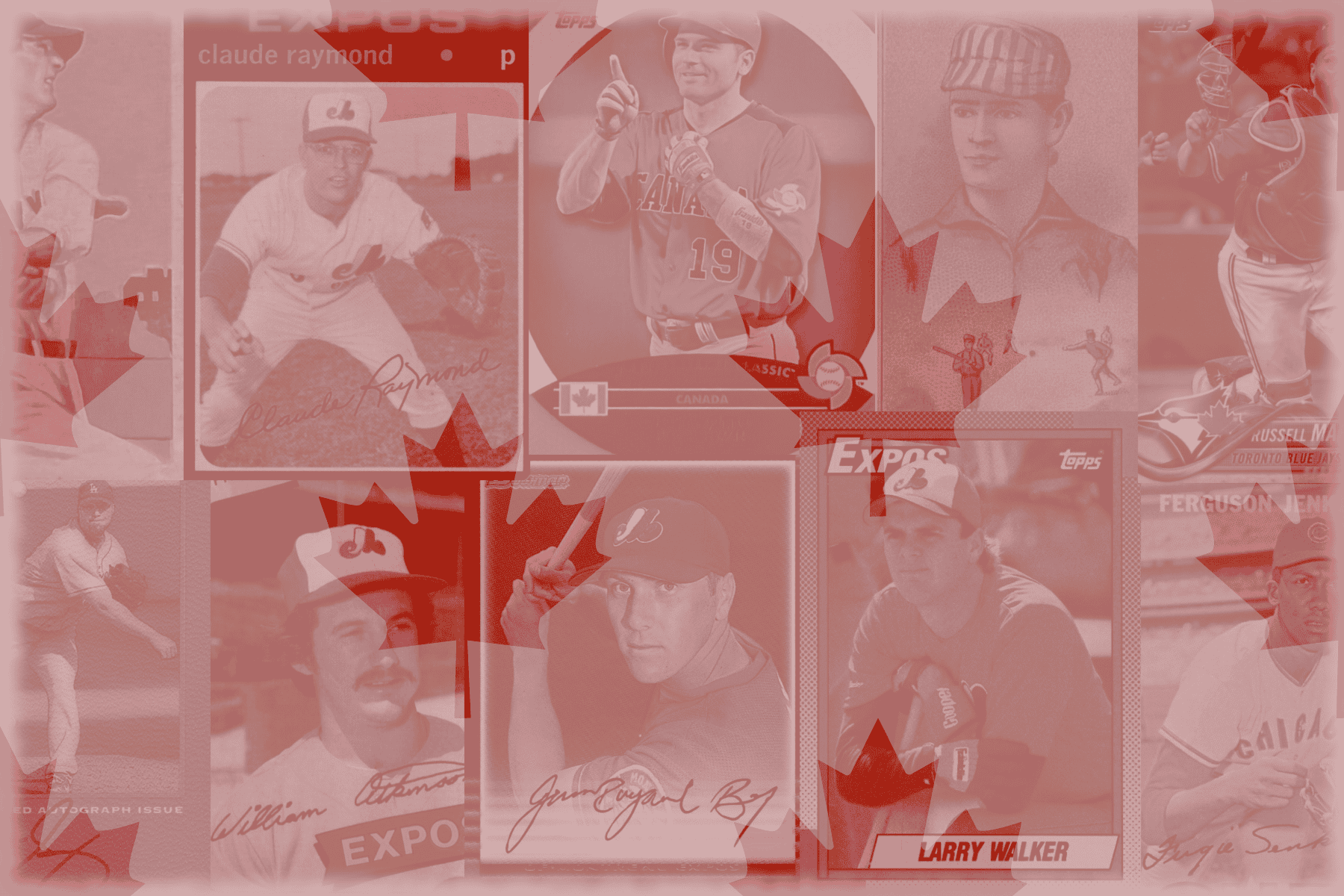Baseball, often hailed as America’s pastime, resonates deeply beyond the borders of the United States, finding a fervent home in the hearts of Canadians. While hockey may hold the title of Canada’s most beloved sport, the nation’s contribution to the world of baseball is undeniable. From the quaint towns of the Maritimes to the bustling cities of Ontario and British Columbia, Canada has produced a remarkable array of talent that has left an indelible mark on the diamond. Here, in honor of Canada Day, we’ll honor the best Canadian baseball players of all time. We’ll also feature each of these Canadian baseball players’ best baseball cards.
[sc name=”ad-250×250″][/sc]
Since the early days of organized baseball, Canadians have embraced the sport with passion and dedication, weaving its rich tapestry into the fabric of Canadian sporting culture. As early as the 19th century, Canadian communities were organizing baseball clubs, laying the foundation for a tradition that would flourish and evolve over the decades.
Canada’s deep-rooted connection to baseball is perhaps best exemplified by the Montreal Expos, a Major League Baseball team that captured the hearts of fans across the country during its existence from 1969 to 2004. While the Expos may have relocated to Washington, D.C., leaving a void in Canadian baseball fans’ hearts, their legacy endures as a testament to the nation’s passion for the game.
Beyond the professional realm, Canada has also been a powerhouse on the international stage, fielding competitive teams in various tournaments, including the World Baseball Classic and the Olympics. Canadian baseball players have proudly donned the maple leaf, showcasing their skills and representing their country with pride on the global stage.
In this article, we pay homage to Canada’s rich baseball heritage by celebrating the top 10 greatest Canadian baseball players the country has ever produced. From trailblazers who paved the way for future generations to modern-day superstars who continue to dazzle audiences with their feats on the field, these Canadian baseball players have left an indelible legacy that transcends borders and unites fans from coast to coast.
10. Jason Bay (Trail, BC)
Player History
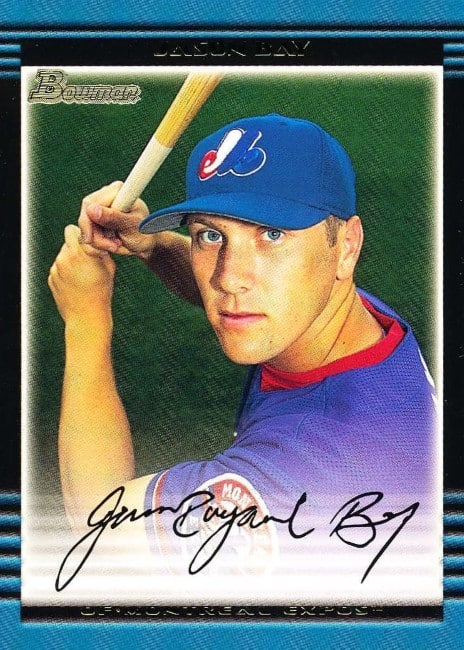
Jason Bay had an MLB career spanning 11 seasons, from 2003 to 2013. Primarily known for his power hitting and clutch performances, Bay played for six different teams: the Pittsburgh Pirates, San Diego Padres, Boston Red Sox, New York Mets and Seattle Mariners.
Born on September 20, 1978, in Trail, British Columbia, Bay spent his formative years playing baseball in his home country. His Little League team reached the Little League World Series in 1990. He excelled at the high school level and eventually played two years at Gonzaga University. The Montreal Expos drafted Bay in the 22nd round of the 2000 MLB Draft. However, he was traded to the Mets without playing in the majors for Montreal.
Bay was a consistent power hitter and offensive player. He led the NL in home runs once in 2005 with the Pittsburgh Pirates, a season where he also became the first player in franchise history to achieve a stat line of .300 batting average, 30 home runs, 40 doubles, 20 stolen bases, and 100 RBIs. He was a three-time National League All-Star (2004, 2005, 2008) and earned a Silver Slugger Award in 2009 with the Boston Red Sox.
Bay played for Team Canada in the World Baseball Classic and is a member of the Canadian Baseball Hall of Fame.
Best Jason Bay baseball card: 2002 Bowman Jason Bay #440 (RC)
Jason Bay has multiple rookie cards, depicting him with both the Expos and the Mets. Of course, for this article, we’re choosing the Expos. His 2002 Bowman is available in many formats, including relic, refractors and buy-back autograph versions. Ungraded, you can find it for as little as $1-$5.
9. Terry Puhl (Melville, SK)
Player History
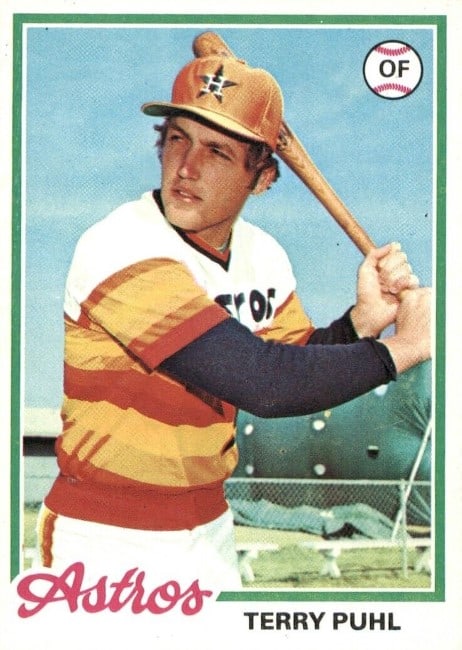
Terry Puhl carved a niche for himself in baseball history with his defensive prowess and consistent offensive contributions. His career spanned 15 seasons (1977-1991), primarily with the Houston Astros (1977-1990). He played a key role in their high-water marks during the late 1970s and 1980s. Puhl’s speed and on-base skills made him a valuable asset, particularly within the Astros’ successful small-ball strategy.
Puhl’s defensive brilliance was his signature. He boasts the highest career fielding percentage (.993) of any outfielder in Astros history. He also ranks eighth all-time among National League outfielders. This remarkable stat translates to a mere 18 errors committed over his 1,300-game career. He made the 1978 National League All-Star team, a prestigious honor for a young player. Additionally, Puhl twice received the Canada Baseball Man of the Year Award and was the inaugural recipient of the Canadian Baseball Hall of Fame’s Tip O’Neill Award in 1984.
Born and raised in Melville, Saskatchewan, Terry Puhl’s baseball journey began in his native Canada. He excelled in various sports but it was on the pitching mound where he initially garnered national recognition. Puhl led his youth league team to a Canadian championship and earning the title of the nation’s outstanding pitcher. Despite his pitching prowess, a Houston Astros scout, Harry Morgan, saw potential in Puhl’s talents as an outfielder. He’d never played the position before but the gamble paid off – Puhl transitioned seamlessly and enjoyed a stellar career.
Terry Puhl’s impressive career statistics and defensive mastery secured his place in Canadian baseball history. He is a member of both the Canadian Baseball Hall of Fame and the Saskatchewan Sports Hall of Fame.
Best Terry Puhl baseball card: 1978 Topps Terry Puhl #553 (RC)
This is Terry Puhl’s rookie card, but more than that, it’s a quintessential 1970s Astros card. Houston’s rainbow-striped jerseys fit perfectly with the colorful design of the card. 1978 was also Puhl’s only All-Star appearance, so this is the perfect card to sum up his career. The card, in ungraded condition, costs around $2-$4.
8. John Hiller (Toronto, ON)
Player History
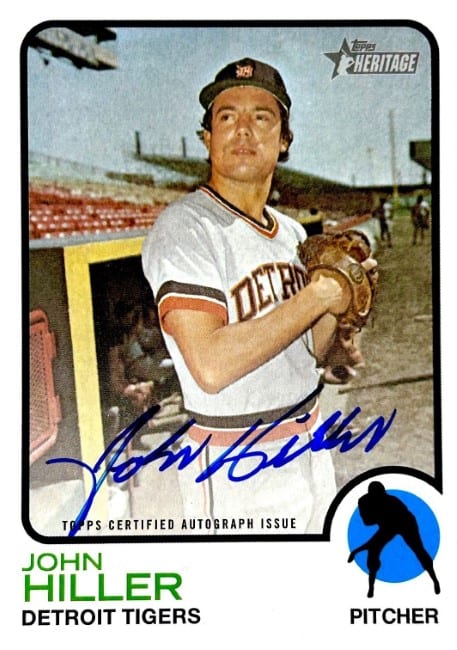
John Hiller had a successful career in Major League Baseball (MLB) as a dominant relief pitcher. Spending his entire 15-year career (1965-1980) with the Detroit Tigers, Hiller established himself as a key figure in the team’s late-1960s resurgence. He was also a fan favorite known for his resilience. While not a typical overpowering closer, Hiller excelled at shutting down late-inning rallies with his pinpoint control and deceptive delivery.
John Frederick Hiller was born in Toronto, Ontario, Canada on April 8, 1943. He spent his formative years in his native country before being scouted by the Detroit Tigers in 1962.
Hiller’s career was marked by consistency and an inspirational comeback story. He was a key contributor to the Detroit Tigers’ 1968 World Series championship team. In 1973, he etched his name in baseball history. After overcoming a major heart attack just two years prior, Hiller defied medical expectations by recording a then-major league record 38 saves and a miniscule 1.44 ERA. This remarkable season earned him the AL Fireman of the Year Award, a recognition for top relief pitchers. It also placed him in the Cy Young Award and MVP voting discussions. He was also selected to the 1974 All-Star team. Hiller’s career totals include 87 wins, 125 saves, and a stellar 2.83 ERA.
John Hiller has not been elected to the National Baseball Hall of Fame in Cooperstown, New York. However, his achievements are well-recognized in Canada. He was inducted into the Michigan Sports Hall of Fame in 1985, the Canadian Baseball Hall of Fame in 1989, and Canada’s Sports Hall of Fame in 1994. These accolades solidify his place as a Canadian baseball legend who overcame adversity to achieve greatness on the mound.
Best John Hiller baseball card: 2022 Topps Heritage Real One Auto John Hiller #ROA-JH
John Hiller played his entire career with the Detroit Tigers, appearing on some unremarkable cards in the 1960s and 70s. This 2022 Topps Heritage Real One autograph makes those cards more interesting. It’s a reprint of his 1973 Topps card, with the added value of an on-card autograph. The card also mentions on the back that his nickname is “Canuck,” owing to his Canadian heritage. The is valued around $10-$20.
7. Tip O’Neill (Springfield, NS)
Player History
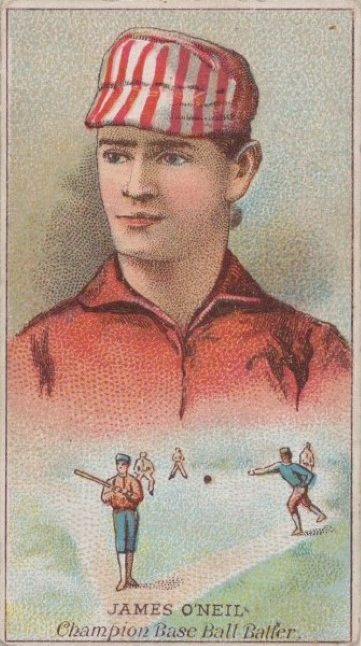
James Edward “Tip” O’Neill (1860-1915) left his mark on the sport during baseball’s formative years. His career spanned roughly from 1883 to 1892, playing for several teams, primarily as a left fielder. However, O’Neill also displayed versatility by starting his career as a pitcher. During his peak years he established himself as one of the game’s most feared offensive threats.
Born in Springfield, Canada West (present-day Ontario) in 1860, Tip O’Neill spent his entire life in Canada. Baseball was flourishing in the region due to its proximity to major American cities and the influence of railroads. O’Neill’s professional career began in his hometown with the Woodstock Club before venturing into the major leagues. He remained fiercely proud of his Canadian heritage throughout his playing days.
O’Neill’s offensive achievements are undeniable. Notably, he is credited with achieving the Triple Crown in 1887. He led the league in batting average (.435, based on rules at the time), home runs (14), and RBI (123). This accomplishment places him among baseball’s elite hitters of the time.
Furthermore, O’Neill holds the record for most consecutive games with an extra-base hit (40). He also remains the only player ever to lead the league in doubles, triples, and home runs in a single season (1887). Despite his offensive prowess, O’Neill never received any major awards during his era. This type of recognition wasn’t commonplace in the 19th century.
Although not enshrined in the National Baseball Hall of Fame in Cooperstown, New York, Tip O’Neill’s legacy is celebrated in Canada. He was inducted into the Canadian Baseball Hall of Fame in 1981. The James “Tip” O’Neill Award, recognizing outstanding Canadian baseball players, is also named in his honor. O’Neill’s role as a pioneering Canadian baseball player during a crucial era solidifies his place as a national sporting icon.
Best Tip O’Neill baseball card: 1887 W. S. Kimball Champions Tip O’Neill
Tip O’Neill only appeared in a handful of card sets from 1887-1889, so searching out his best card takes some effort. He had one of the most dominant seasons of any player, ever, in 1887. We’re honoring him with the 1887 W. S. Kimball Champions, which credits him as “James O’Neil.” The coloring on the card is beautiful, in a soft style of artwork. PSA 8s have been registered and sold for several thousand dollars, but more modest grades sell for around $500.
6. Justin Morneau (New Westminster, BC)
Player History

Justin Morneau enjoyed a 14-year career in Major League Baseball as a dominant first baseman. Primarily known for his exceptional power and on-base skills, Morneau established himself as a key offensive force throughout his career. He played for four teams – the Minnesota Twins (2003-2013), Pittsburgh Pirates (2013), Colorado Rockies (2014-2015), and Chicago White Sox (2016) – but his most significant impact came with the Minnesota Twins, where he became a fan favorite and a franchise cornerstone.
Morneau was born in New Westminster, British Columbia, Canada in 1981. He spent his formative years in his native country, excelling in various sports, before being drafted by the Minnesota Twins in the 1999 MLB Draft.
Morneau’s accolades speak volumes about his offensive prowess. He captured the AL MVP Award in 2006; this achievement solidified his reputation as one of the game’s elite hitters. Morneau also finished runner-up for the MVP Award in 2008 and was a four-time All-Star selection (2004, 2006, 2007, 2010). He captured two Silver Slugger Awards (2006, 2008) recognizing his outstanding hitting among AL first basemen. His career totals include a respectable .278 batting average, 247 home runs, and 830 RBIs, further solidifying his legacy as a consistent offensive threat. Morneau also played a key role in the Minnesota Twins’ success, helping them reach the playoffs on multiple occasions.
Justin Morneau was inducted into the Minnesota Twins Hall of Fame in 2021. He currently serves as a Special Assistant in the Twins’ front office, while also providing color commentary for the team.
Best Justin Morneau baseball card: 2002 Topps Traded Signature Moves Justin Morneau #TA-JMO (RC)
Like many modern players, Justin Morneau has a lot of cards, from base sets and parallels, to relics and autographs. His true rookie cards are in 2001 sets, and many show him as a catcher (a position he never played in the majors). However, the Justin Morneau 2002 Topps Signature Moves autographed card from his sophomore season brings together early ’00s design with a great on-card autographed set. The card costs around $20 in ungraded condition, and 2-3 times that price for a near-mint graded version.
5. Russell Martin (East York, ON)
Player History
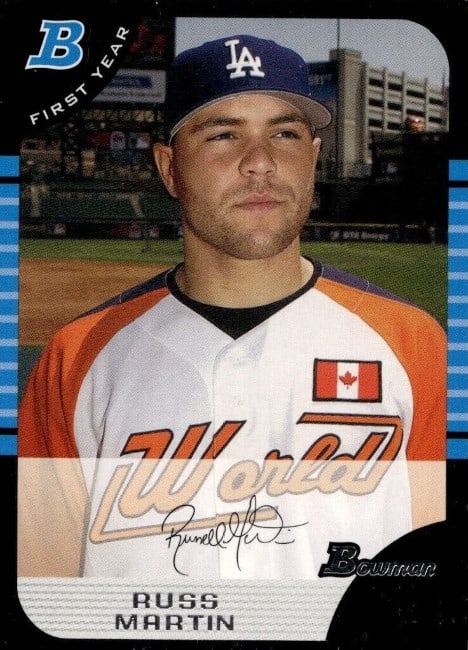
Russell Nathan Coltrane Jeanson Martin Jr. had a successful 14-year career in Major League Baseball as a well-rounded catcher. Primarily known for his defensive prowess behind the plate, Martin established himself as a valuable asset for several teams throughout his career. He played for the Los Angeles Dodgers (2006-2010), New York Yankees (2011), Pittsburgh Pirates (2013), Toronto Blue Jays (2015-2018), and briefly for the Los Angeles Dodgers again in 2019. Martin’s ability to handle pitchers, frame pitches, and provide leadership on the field made him a coveted player.
Russell Martin was born in East York, Ontario, Canada in 1983. He played baseball from a young age and he was drafted by the Montreal Expos in the 2000 MLB Draft, before being selected again by the Los Angeles Dodgers in 2002. Although he only played four seasons for a Canadian team, Martin remained a source of pride for Canadian baseball fans, becoming the first Canadian-born catcher to start in an MLB All-Star Game.
Defensively, Martin was a standout. He captured the prestigious Gold Glove Award in 2007. This recognition solidified his reputation as an elite defensive catcher. Additionally, Martin’s offensive contributions were significant. He was a four-time All-Star selection (2007, 2008, 2010, 2015) and received the Silver Slugger Award in 2007. Over his career, Martin accumulated a respectable .248 batting average, 191 home runs, and 1,416 hits.
Russell Martin was inducted into the Canadian Baseball Hall of Fame in 2019.
Best Russell Martin baseball card: 2005 Bowman Draft Chrome Russell Martin #BDP135
Russell Martin’s 2005 Bowman Draft Chrome card is the best of both worlds – it’s his rookie card, and he’s also shown wearing his World team uniform with a Canadian patch. The card has a black border and chrome section for Martin’s facsimile signature, as well as a “First Year” tag in the corner. The card comes in refractor, X-fractor and other parallel versions, but the base card is worth approximately $4 ungraded.
4. Jeff Heath (Fort William, ON)
Player History

Jeff Heath was a Canadian baseball player whose career spanned from 1936 to 1949. Primarily known for his power hitting, Heath played for several teams throughout his career, including the Cleveland Indians, Washington Senators, St. Louis Browns, Boston Braves, and Philadelphia Phillies. He was a feared hitter during his time in the Major Leagues, known for his ability to drive the ball with authority.
Jeff Heath was born on April 1, 1915, in Fort William, Ontario, Canada. His family moved to British Columbia before settling over the border in Seattle, WA. excelled as a multi-sport athlete, particularly in football, but settled on a career in baseball when he signed with a minor league team in 1935.
During his career, Jeff Heath achieved several significant milestones and accolades. In 1941, he led the American League in triples with 20 while playing for the Cleveland Indians. Heath was also selected to two All-Star Games in 1941 and 1943. Additionally, he finished in the top 10 in MVP voting once. Also in 1941, he became the first player from the American League to become a member of the 20–20–20 club when he hit 20 each of doubles, triples and home runs in the same season. He finished his career with 194 home runs and 1,447 hits, with a lifetime batting average of .293. At the time, he was the leader in home runs for a foreign-born player.
To date, Jeff Heath has not been elected to the National Baseball Hall of Fame.
Best Jeff Heath baseball card: 1949 Bowman Jeff Heath #149
This card comes from Heath’s last season, which was with the Boston Braves. The early Bowman sets were known for their vibrant colors, and this portrait of Heath shows it off well. Condition is key here, and a near-mint card can fetch around $100-$200.
3. Joey Votto (Toronto, ON)
Player History
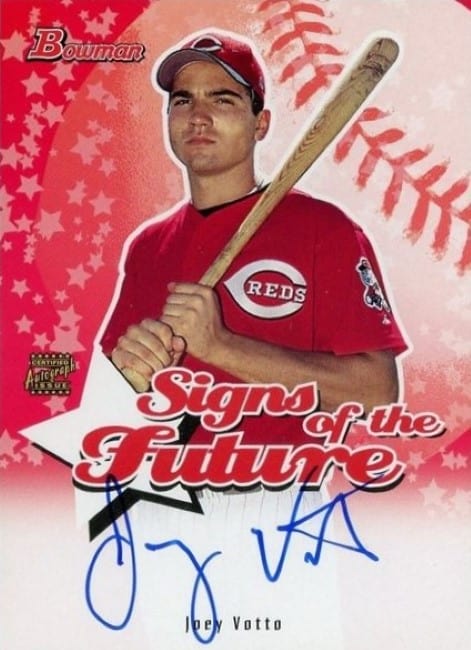
Joey Votto has enjoyed a prolific career spanning from 2007 to the present day. To date, he has played his entire career with the Cincinnati Reds. Votto is primarily known for his exceptional batting prowess. He is often regarded as one of the most disciplined and patient hitters in the game’s recent history. His ability to consistently get on base and deliver clutch hits has made him a cornerstone of the Reds’ lineup for over a decade.
Born on September 10, 1983, in Toronto, Ontario, Canada, Joey Votto grew up playing baseball and hockey in Canada. Despite his success in MLB, Votto maintains strong ties to his Canadian heritage and has represented Canada in international baseball competitions.
Throughout his career, Joey Votto has amassed numerous achievements and accolades. In 2010, he was named the NL MVP after leading the league in on-base percentage (.424), slugging percentage (.600), and OPS (1.024). He finished in the top 10 of MVP voting an additional five times, including a second place vote in 2017.
Votto is a six-time MLB All-Star, earning selections from 2010-2013, and 2017-2018. He has also won the NL Hank Aaron Award twice, in 2010 and 2017, recognizing the league’s top offensive performer. Additionally, Votto received a Gold Glove Award in 2011 for his exceptional defensive skills at first base.
Since Votto is still playing, he may well ascend this list further before his career is complete. With 256 home runs, 2,135 hits and a career batting average of .294, Votto will eventually be in the conversation for inclusion in the Baseball Hall of Fame.
Best Joey Votto baseball card: 2004 Bowman Signs of the Future Joey Votto Autograph #SOFJV
We’ve previously described Joey Votto’s rookie card situation as complicated – his first Reds card was in the 2002 Topps T206 set, but 2008 cards celebrate his major league debut. Still we love this 2004 Bowman Signs of the Future as a clean, well-designed early autograph from Joey Votto. Near-mint versions sell for around $300-$400.
2. Larry Walker (Maple Ridge, BC)
Player History
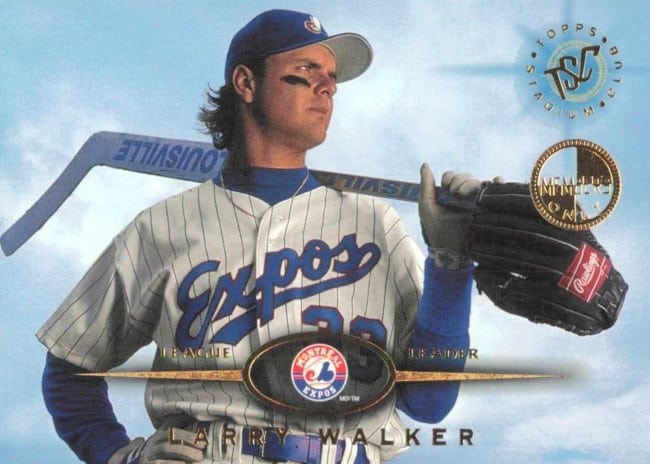
Larry Walker enjoyed a distinguished career spanning from 1989 to 2005. Walker played for three teams in Major League Baseball: the Montreal Expos, Colorado Rockies, and St. Louis Cardinals. He is a five-tool player, known for his combination of power hitting, speed, and defensive prowess. His skills make him not only one of the best Canadian baseball players, but one of the most versatile players of his era.
Born on December 1, 1966, in Maple Ridge, British Columbia, Larry Walker grew up playing hockey and baseball in Canada. He had aspirations to be a goaltender, but he was spotted by the Expos and signed in 1984, and became their starting right fielder in 1990.
Larry Walker’s career boasts numerous achievements and accolades. He was a five-time MLB All-Star and three-time Silver Slugger award recipient. Walker also won the NL MVP award in 1997 – becoming the first Canadian baseball player to achieve this honor – and earned seven Gold Glove Awards for his outstanding defense in the outfield. Additionally, Walker captured three NL batting titles, in 1998, 1999, and 2001, solidifying his reputation as one of the premier hitters of his generation. After his career ended, Walker began coaching Team Canada, playing in three World Baseball Classics and two Pan-Am Games.
In 2020, after years of eligibility, Larry Walker was elected to the National Baseball Hall of Fame. He garnered 76.6% of the votes from the Baseball Writers’ Association of America (BBWAA). Walker has also been elected to the Canadian Baseball Hall of Fame and Canadian Sports Hall of Fame. He was also named the 13th-greatest sporting figure from Canada by Sports Illustrated.
Best Larry Walker baseball card: 1995 Stadium Club Larry Walker #148
Nothing says “O, Canada” like this 1995 Stadium Club card. Stadium Club has long been known for quality photography with an interesting slant, and they pulled it off with Larry Walker’s card. He’s depicted holding both baseball and hockey gear – a nod to growing up playing both sports. Since it’s from the junk wax era, an ungraded version is easy to come by and costs around $2.
1. Fergie Jenkins (Chatham, ON)
Player History
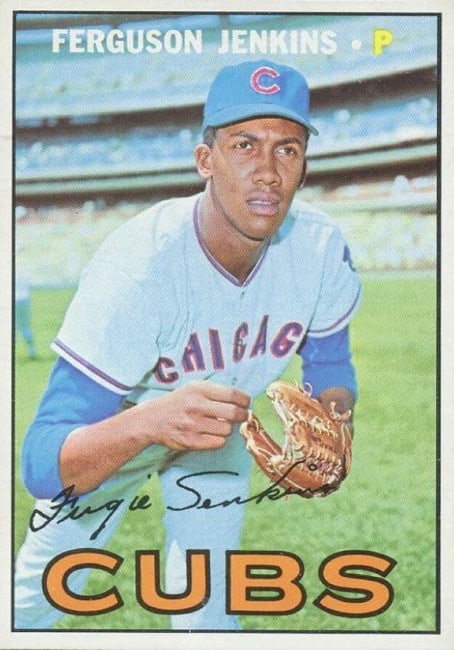
Ferguson “Fergie” Jenkins, a right-handed pitcher, carved a remarkable career in Major League Baseball (MLB) spanning 19 seasons, from 1965 to 1983. He suited up for four teams – the Philadelphia Phillies, Chicago Cubs, Texas Rangers, and Boston Red Sox – but his most iconic years were spent with the Chicago Cubs. Jenkins was renowned for his exceptional control, pinpoint accuracy, and remarkable durability, evidenced by his high number of complete games.
Born on December 13, 1942, in Chatham, Ontario, Canada, Jenkins spent his formative years in his home country. Jenkins’ parents were also athletes, and Jenkins lettered in five different sports. He initially wanted to be a professional hockey player but signed with the Phillies to play professional baseball.
Jenkins’ resume boasts numerous achievements. He won the Cy Young Award in 1971, becoming the first Canadian pitcher to achieve this feat. He led the league in wins twice, complete games a staggering four times, and walks per nine innings a dominant five times. His win totals were equally impressive, with seven seasons where he surpassed the coveted 20-win mark, including a career-high 25 wins in 1974 with the Texas Rangers. Notably, he was also the first player to win both the National League (NL) and American League (AL) win titles. He’s not only one of the best Canadian baseball players ever, he’s also one of the best Cubs players of all-time.
After his MLB career, Jenkins played several seasons for the London Majors, a minor league team in Canadian professional baseball. In 1985, he unsuccessfully ran for office as part of the Ontario Liberal Party.
In 1991, Ferguson Jenkins became the first Canadian elected to the National Baseball Hall of Fame. He’s also received the Order of Canada, the second-highest honor from the Canadian government.
Best Fergie Jenkins baseball card: 1967 Topps Fergie Jenkins #333
Ferguson Jenkins’ first Topps card is a beauty, with wonderful coloring throughout – the design, his uniform and the background all pop. For an ungraded version, it costs around $75. Expect to pay 2-3 times that price for a near-mint graded card.
